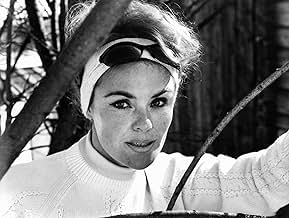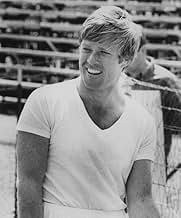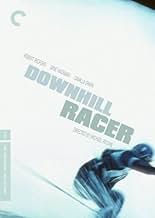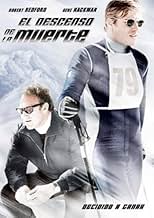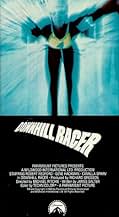NOTE IMDb
6,3/10
5,7 k
MA NOTE
Ajouter une intrigue dans votre langueQuietly cocky David Chappellet joins the U.S. ski team as downhill racer and clashes with the team's coach, Eugene Claire.Quietly cocky David Chappellet joins the U.S. ski team as downhill racer and clashes with the team's coach, Eugene Claire.Quietly cocky David Chappellet joins the U.S. ski team as downhill racer and clashes with the team's coach, Eugene Claire.
- Réalisation
- Scénario
- Casting principal
- Victoire aux 1 BAFTA Award
- 1 victoire et 5 nominations au total
Avis à la une
In this film, Robert Redford plays David Chappellet a young man training on a ski team with hopes of making the Olympics. The film is basically a character study of a somewhat narcissistic, shallow, self-centered guy from a simple rural background who dreams of attaining fame and fortune by entering the Olympics as a downhill racer. Throughout the film we see examples of his failure to connect with people. He visits his dad on his ranch and is received with complete coldness and indifference. He pulls into town and picks up an old girl friend, takes her for a ride and they have sex. Afterwards, he completely ignores her when she tries to tell him about her life. He pursues Camilla Sparv who plays the beautiful Carole Stahl. In her, he has met his match. She seems to be someone who also uses people, never lets them get very close and always has an agenda to get what she wants. She works for a ski manufacturer who seems to use her to bait the young up and coming skiing stars that he seeks to groom for product advice and future endorsements. She is narcissistic, shallow and self-centered like him but she is also elusive. This plays to the competitor in him and she knows that. Throughout the film we see Gene Hackman who plays the skiing coach Eugene Claire. We witness numerous scenes where Chappellet ignores his advice and counsel, where the coach calls him on his arrogance and selfish attitude. But in the end, they triumph and seem to be headed for the Olympics. But in the last brief scene, victory and fame seems so fickle, elusive, short lived, it all seems superficial. Redford is wonderful in this and of course, Gene Hackman is just as good. Seeing these two early in their careers, that alone makes this a film worth watching.
Well filmed, almost documentary style look at the world of Alpine skiing (aside from bizarrely over-dramatic music at times). The skiing scenes are generally exciting to watch, and get better as the film goes on. The acting is also good in a purposely muted way, with Redford trying to play against type as a driven but strangely detached individual, who has sublimated his entire personality in the desire to be a champion. Perhaps as a result of this 'hero', watching the film is never all that stimulating. Afterwards, one appreciates the intelligence of the acting and directorial choices made and the effect of certain scenes - the hero with his dreary dad or the girl back home, the new 'fashionable' girl who is more selfish than him, they way he shuts her up when she tries to 'gently' ditch him, the coach with one eye on the profits to be made but humane enough to care about his team. The ending is particularly memorable, designed to make us question the very cliche of wanting the hero to be the winner. In that respect (underlying irony) it shares something with other Michael Ritchie films I have seen- The Candidate and Smile. Just not as much fun maybe.
There were some curious choices made when this movie was put together. There seems no reason why the film couldn't have been much more successful if it had wanted to be. It has some fine actors, the skiing is great and the plot is basically the same as "Top Gun".
Robert Redford is one of the most charming and charismatic leading men of the modern era, but here he plays an unlikeable loner. In fact, almost everyone in the film is more likable than Redford, and you really wish someone would beat some sense into him. So we don't really care that much if he wins or loses.
The film isn't helped much by the jazz score, which would work for some noir detective flick, but hardly for the high adrenaline sport of downhill racing. Pity.
Robert Redford is one of the most charming and charismatic leading men of the modern era, but here he plays an unlikeable loner. In fact, almost everyone in the film is more likable than Redford, and you really wish someone would beat some sense into him. So we don't really care that much if he wins or loses.
The film isn't helped much by the jazz score, which would work for some noir detective flick, but hardly for the high adrenaline sport of downhill racing. Pity.
The appeal of a ski film to those who ski is obvious. But imagine yourself innocent of skiing. Can it hold the attention of the rest of us? Roone Arledge and his "Wide World of Sports" provided one answer, as Jean Claude Killy and his successors skied into American living rooms on many winter Saturdays. "Downhill Racer" seconds the motion.
The late Mike Ritchie, who'd essayed nothing more ambitious than commercials, traveled the World Cup circuit in the 1967-68 winter, accompanied by Aspen novelist Jim Salter, whose screenplay (from Oakley Hall's very different novel) effectively was written in segments the night before each shoot. Almost everything about this production was improvised.
Athletes are not necessarily interesting people. Killy was; stories about him, some even true, are legion. David Chappellet (a young Robert Redford), more typically, reminds one of the astronauts in "2001", with their limited range of expressions and nothing particularly interesting to say. This comes across powerfully in several hilarious interview scenes, with American and European journalists trying in vain to get the young man to say something worth writing down.
Wengen, Switzerland passes for several World Cup race sites. (A Swiss medico wears an armband identifying him as "Arzt", or doctor, at a supposed French venue). The filmmakers also were present in Grenoble for the Winter Olympics, providing a fictional inside look at the Games far different from that of, for example, "Chariots of Fire".
One still doesn't ski, but the pleasures of "Downhill Racer" are undeniable.
The late Mike Ritchie, who'd essayed nothing more ambitious than commercials, traveled the World Cup circuit in the 1967-68 winter, accompanied by Aspen novelist Jim Salter, whose screenplay (from Oakley Hall's very different novel) effectively was written in segments the night before each shoot. Almost everything about this production was improvised.
Athletes are not necessarily interesting people. Killy was; stories about him, some even true, are legion. David Chappellet (a young Robert Redford), more typically, reminds one of the astronauts in "2001", with their limited range of expressions and nothing particularly interesting to say. This comes across powerfully in several hilarious interview scenes, with American and European journalists trying in vain to get the young man to say something worth writing down.
Wengen, Switzerland passes for several World Cup race sites. (A Swiss medico wears an armband identifying him as "Arzt", or doctor, at a supposed French venue). The filmmakers also were present in Grenoble for the Winter Olympics, providing a fictional inside look at the Games far different from that of, for example, "Chariots of Fire".
One still doesn't ski, but the pleasures of "Downhill Racer" are undeniable.
After many years of catching brief scenes of this now semi-cult film, I finally watched it in its entirety. It is not a great film, but for film students, and fans of both Gene Hackman and Robert Redford, it's a must. The opening credits are delivered over scenes of a Super G skier flying down the mountain and feature a combination of stop action and over-cranked footage. The film quality is beautiful, and although the techniques now seem dated, they stand for what was cutting-edge editing at the time. Watching the opening, you feel like you're in for a great ride but are sadly let down by a staid script. Having said that, the film can sort of get a way with this (at least to a certain extent) because you've got such great actors playing the main roles of skier (Redford) and coach (Hackman). Both know how to exploit the economy of language and show a lot simply with body language and expression. (They must have realized they had to with this script.) Add to that fact, that the character Redford is playing - a vainglorious Super G racer named David Chappellett, probably wouldn't have much to say.
Ultimately, the film serves as cinematic commentary on how fleeting success is in a sport like skiing, as well as the shallowness shown by both the press that cover the sport, and the women that covet the skiers.
Ultimately, the film serves as cinematic commentary on how fleeting success is in a sport like skiing, as well as the shallowness shown by both the press that cover the sport, and the women that covet the skiers.
Le saviez-vous
- AnecdotesTen days before filming began, star Robert Redford accidentally drove a snowmobile over a cliff, tearing his tendon and requiring seven stitches in his knee.
- GaffesTires don't squeal on snow, yet Dave manages this when driving the Porsche.
- ConnexionsFeatured in Siskel & Ebert & the Movies: Robert Redford (1992)
Meilleurs choix
Connectez-vous pour évaluer et suivre la liste de favoris afin de recevoir des recommandations personnalisées
- How long is Downhill Racer?Alimenté par Alexa
Détails
- Date de sortie
- Pays d’origine
- Langues
- Aussi connu sous le nom de
- Cuesta abajo
- Lieux de tournage
- Sankt Anton am Arlberg, Autriche(Arlberg-Kandahar World Cup race)
- Sociétés de production
- Voir plus de crédits d'entreprise sur IMDbPro
Box-office
- Budget
- 1 600 000 $US (estimé)
Contribuer à cette page
Suggérer une modification ou ajouter du contenu manquant


